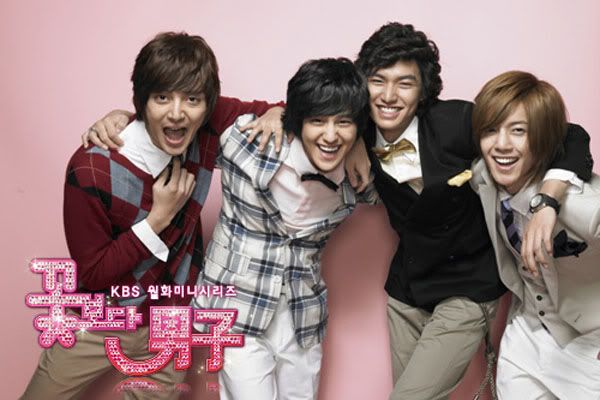
I’d say it got off to a choppy start, with good and bad points and a couple nice surprises. I’m not terribly disappointed, but I also wasn’t expecting gold, either.
On the other hand, I think I’m going to have a blast watching this, regardless. (Let’s just say: Before this drama, Jeon Ki-sang directed Delightful Girl Chun-hyang, My Girl, and Witch Amusement. Two of those were good, one was terrible — but all were hilariously watchable.) Either way, I’m set.
SONG OF THE DAY
House Rulez – “사랑이라는 이름의 별” (A Star Named Love) [ Download ]
Audio clip: Adobe Flash Player (version 9 or above) is required to play this audio clip. Download the latest version here. You also need to have JavaScript enabled in your browser.
CAVEAT
Now that the drama has started, I’d like to write about it as its own entity, away from the established details of the Hana Yori Dango universe. (There are a few exceptions to this rule, but I’ll explain when I get to those.) The reason is, while it was fun to speculate before its broadcast, now there’s no more need to refer overly to “canon” Hanadan. I recognize that one can only say “Well, in the original series…” so many times before it gets really annoying. Plus, it alienates people who are watching without pre-existing knowledge.
Of course, you’re free to say whatever you like — these are mostly ground rules for myself.
BACKGROUND
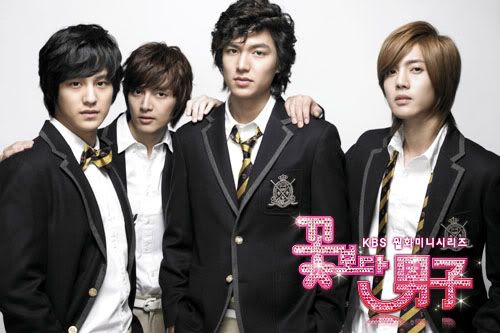
The title “Boys Before Flowers” (or the Japanese hana yori dango) refers to the privileged quartet who rule the roost at their elite private school. They’ve adopted the name “Flower Four,” which gets shortened to F4, and are in their last year of high school at the incredibly exclusive school for the insanely wealthy, Shinhwa High School. It’s so sought-after that aspiring attendees are placed on a waiting list practically upon birth. The school starts with Shinhwa Kindergarten and goes straight through Shinhwa University.
Apparently “hana yori dango” is a Japanese adage meaning that food (dango) is more important than flowers (hana) — or rather, sustenance comes before superficial beauty. The manga twisted that to suggest that boys (dango) were more important than flowers. A third reading suggests that these four characters are “boys” before they’re “flowers” — that is to say, their roles as people are more important than their collective fame as Flower Four.
EPISODE 1 RECAP
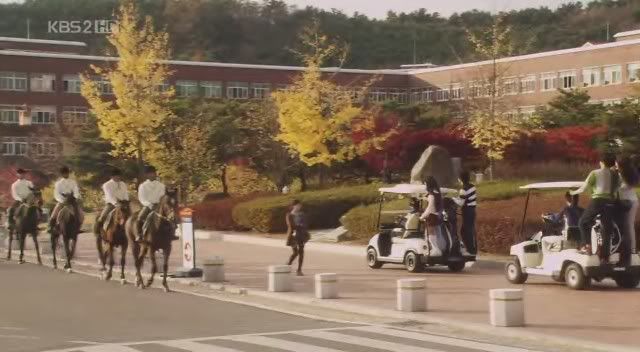
In this world, Shinhwa Group (“shinhwa” meaning “legend”) is the most powerful corporation in Korea, perhaps best compared to real-life Samsung, only bigger and more powerful. Shinhwa makes cars, owns department stores, and is virtually everywhere — its empire even includes an elite school. At the beautiful Shinhwa campus, pampered students flaunt their wealth and band together in cliques.
Unfortunately, just being rich isn’t enough to survive the teen tyranny at Shinhwa — outsiders or loners are often marked as targets by the bored uber-clique F4. Once a student is delivered F4′s “red card,” it signals the rest of the school to go all out in harassment and bullying.
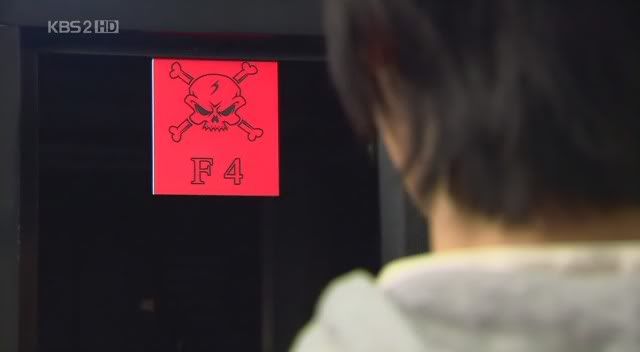
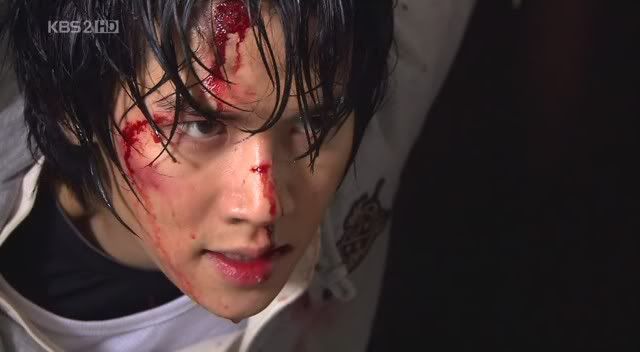
This guy, having just received the dreaded red card, is immediately chased by students and beaten. He’s cornered into a bathroom, puts up a good fight, and manages to escape.
Geum Jan-di (actress Gu Hye-sun) arrives at the school bearing a dry-cleaning delivery, amazed at all the splendor. Students talk excitedly about the newest F4 victim, joking that they’d known he wouldn’t last long. Recognizing the boy’s name, Jan-di follows the crowd outside, where they all look up at the rooftop, where the battered guy stands poised to jump off the building.
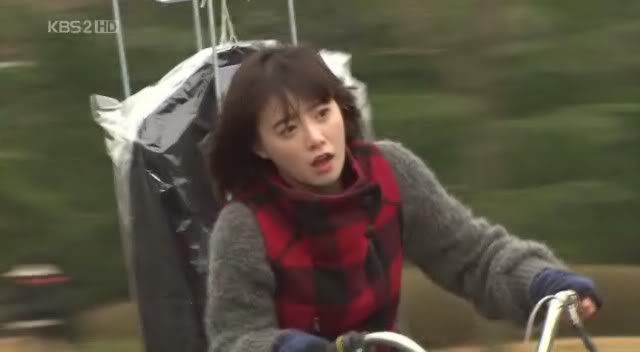
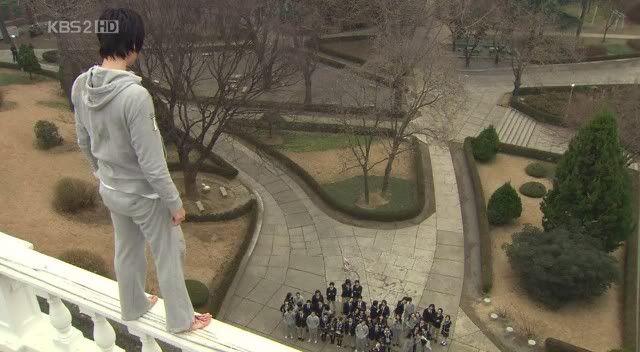
The guy shouts to his audience, “This what you want, isn’t it? Fine, I’ll give you what you want.” He starts to step off the ledge — but Jan-di bursts on the scene, yelling to get his attention. She’s got his dry-cleaning! That’ll be $30, please!
Jan-di isn’t too quick on the uptake, because she doesn’t grasp the severity of the moment until the boy tells her to get the money from his family after he dies. At this, Jan-di gasps in horror: “Are you about to die? Why? You go to such a nice school.” He tells her, “This isn’t school, it’s hell.” Jan-di corrects him, saying, “Excuse me, but the real hell is outside.”
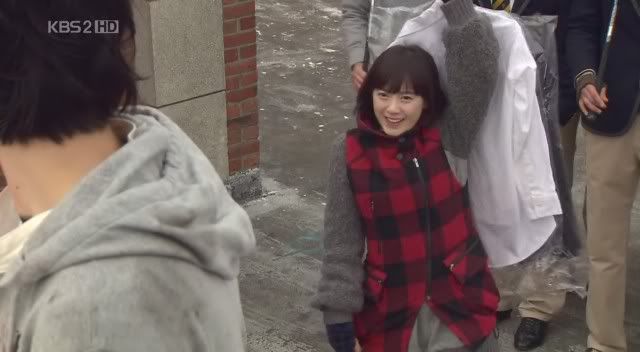
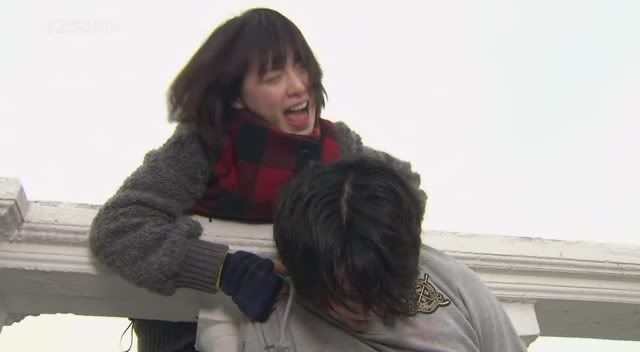
He asks if she knows what F4 is (she doesn’t), and explains that their red card makes you a hunted man. Finally realizing that this mysterious F4 is why he’s all bloody and ready to jump off a building, Jan-di indignantly asks, “And you’re going to let them get away with that?” If this was her school, she’d show them who was boss. The guy tells her that her friends are lucky to have a friend like her — and then jumps.
Everyone gasps — Jan-di lurches forward — and grabs him on his way over the ledge. Saved!
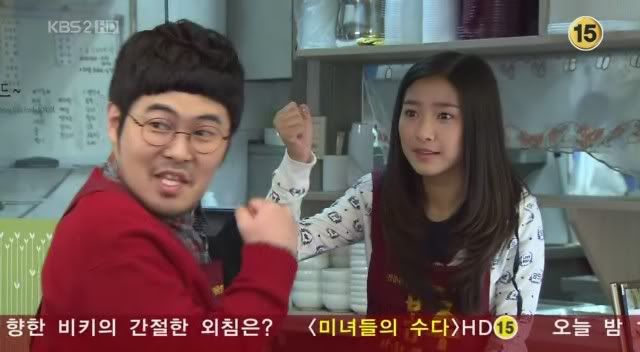
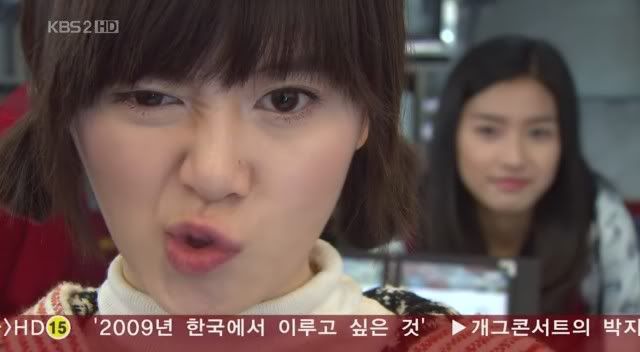
Photos are uploaded, news spreads quickly, and pretty soon, Jan-di is hailed as a hero in the media, a sort of Wonder Woman for the working class. As this occurred on a Shinhwa campus — and worse, a Shinhwa heir is involved (albeit indirectly as F4′s leader) — citizens denounce the Shinhwa Group. Housewives agree to boycott Shinhwa stores, candlelight vigils are held, people demonstrate.
Jan-di’s best friend Ga-eul and her boss cheer her on (the girls work after school at a neighborhood restaurant). Ga-eul wistfully wonders if the F4 boys are as cute as they say, but Jan-di is not at all impressed. She calls them Fly Four instead — dung flies.
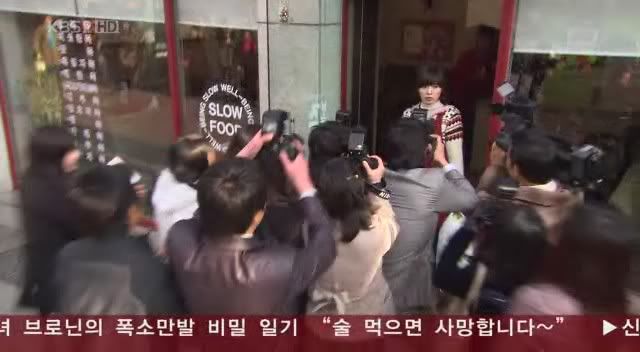
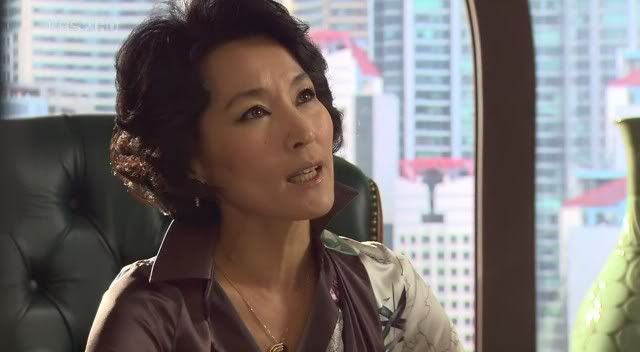
Naturally, the outcry is a pain in the neck for Shinhwa Group’s CEO, Kang Hee-joo, who happens to be mother to F4 leader Gu Jun-pyo. She vents her ire on her secretary, Mr. Jung (perfectly cast, by the way): “You know why public opinion is frightening? Because they’re ignorant!”
What, then, can be done for damage control? Offer the commoner a scholarship to Shinhwa High School, of course!
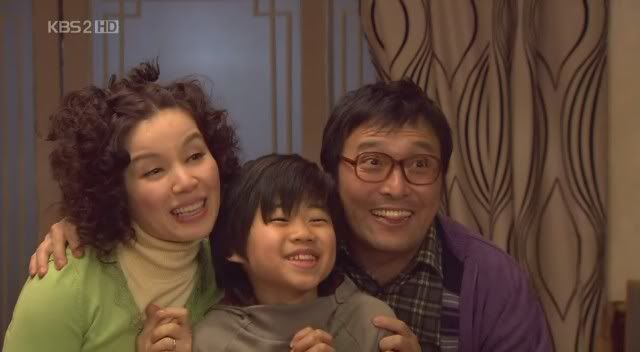

Jan-di’s family is thrilled. Jan-di is not.
She refuses to go to the school, preferring her life as it is. Her parents, on the other hand, think it’s foolish for her to pass up a free education that even the rich and powerful would kill for. Plus, they wheedle, the school has a swimming pool… and remember how much she liked swimming? Jan-di is not so easily bought, but still, the end result is a foregone conclusion. The next day, she arrives at her new school.
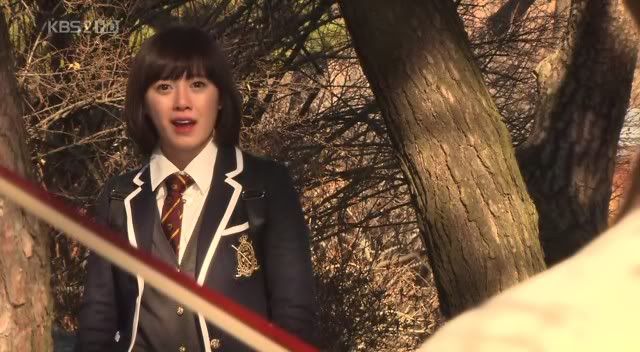
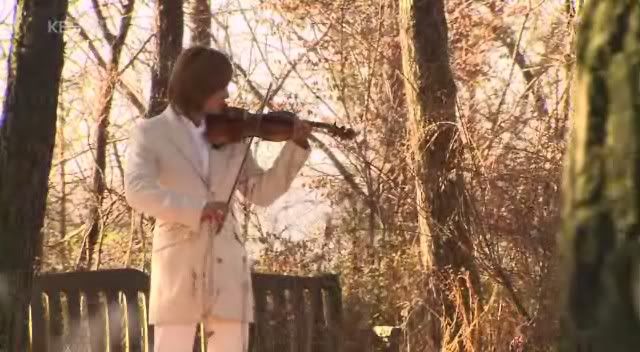
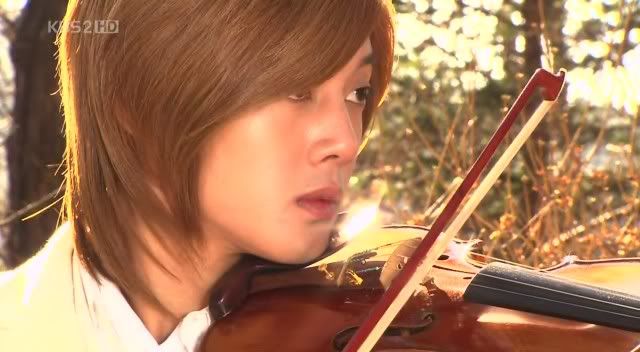
Predictably, she is a complete fish out of water in this place where students flash luxury vehicles (Jun-pyo arrives by helicopter) and designer clothing.
Jan-di wanders around, searching for the swimming pool, when she hears the strains of a violin. Curious, she follows the sound and comes to its source: It’s Yoon Ji-hoo, dressed all in white, playing his violin out in the woods. As we all do.
When he sees her, she asks in a flustered tone for the pool, and he points her in the right direction. She runs off in mortification, but also impressed at Ji-hoo’s
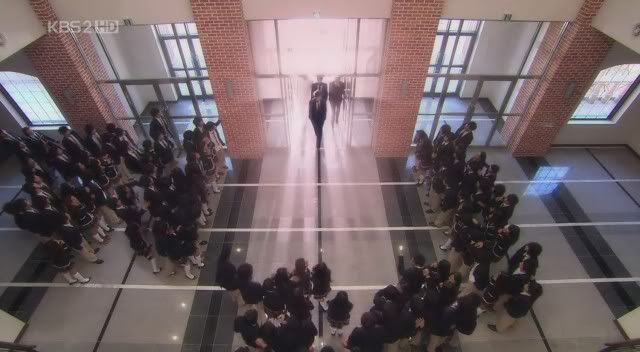
Now for the Grand Entrance:
F4′s appearance sends all the girls squealing and everyone rushing to the entrance to welcome their overlords. No seriously, you practically expect somebody to genuflect at their feet. As it is, F4 arrives in a blaze of glory and glamour-shot backlighting.
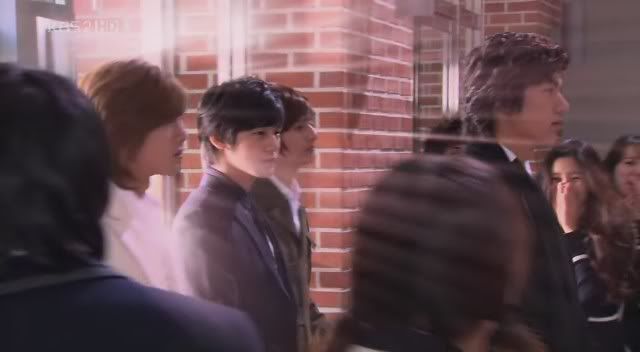
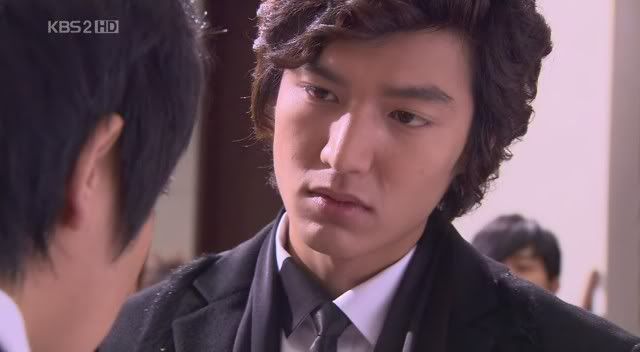
Jun-pyo looks over at one of the bystanders, who immediately quivers in fear. In a supremely bored but authoritative voice, Jun-pyo asks Woo-bin for the rest of his juice, then pours it all over the hapless student.
(The guy had been bragging earlier about wearing a shirt only he and Jun-pyo owned, and Jun-pyo is not pleased to be caught similarly dressed.)
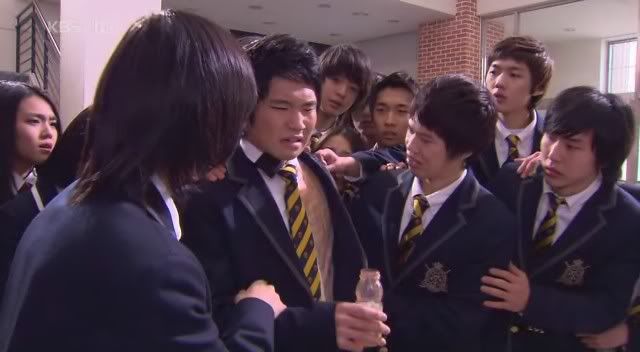
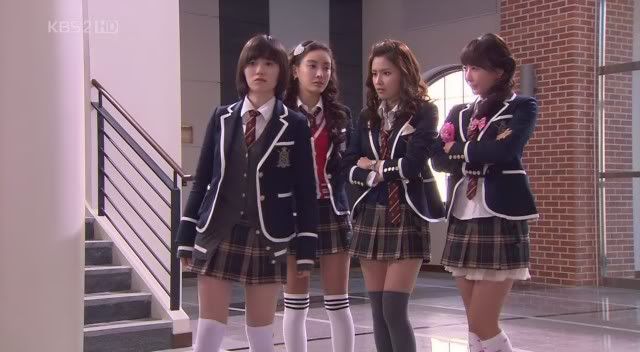
Afterward, Jan-di sputters at Jun-pyo’s assiness. She calls him a crazy bastard, then wonders if everyone else is also crazy, watching his reign of terror without saying anything.
This attracts the attention of the school’s three queen bees, who introduce themselves as Ginger (the leader), Sunny, and Miranda (or Shinhwa’s “jin, sun, and mi” — a way of saying they’re the most beautiful). Ginger’s affectation is to make horrified exclamations in English (e.g., “Oh. My. God.”), while Sunny’s my favorite because she seems vaguely dim. They stick up for F4 and tell Jan-di to watch what she says.
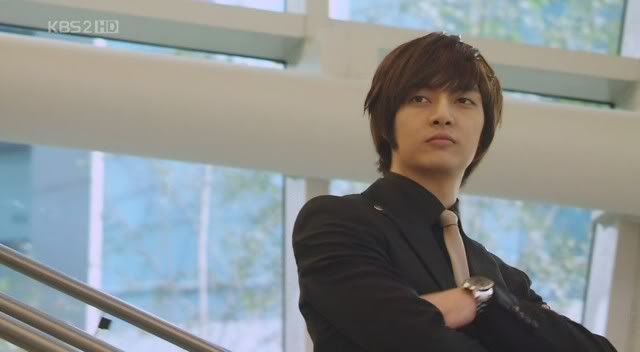
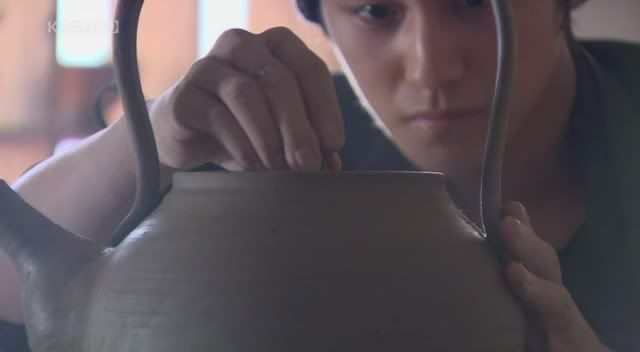
Deciding to acquaint herself with the members of F4, Jan-di and her brother surf the internet for their bios:
Song Woo-bin (actor Kim Joon) is heir to a construction enterprise; his father is a real estate magnate.
So Yi-jung (Kim Bum) is a pottery genius who comes from an artistic lineage; his grandfather also owns a famous art museum.
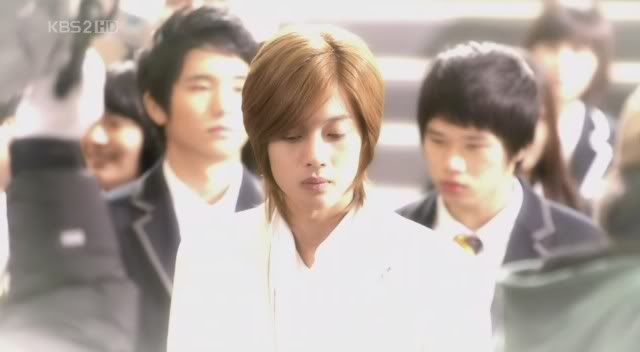
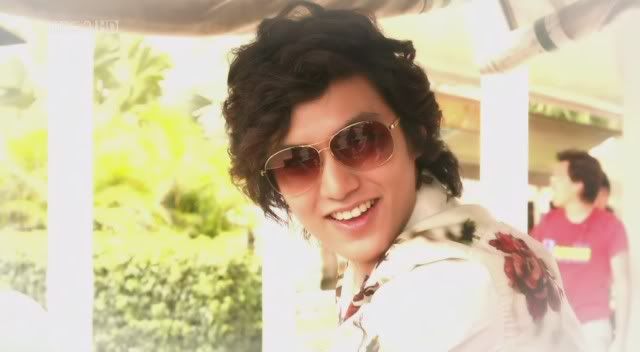
Yoon Ji-hoo (actor-singer Kim Hyun-joong) is the grandson of a former president, and the sole surviving descendant, as his parents died in car crash when he was five. His family owns a variety of rich-people toys, like an art center, a European soccer team, and a major league baseball team.
And then there’s Gu Jun-pyo (Lee Min-ho). The others are famous among rich society, but Jun-pyo, as the heir to Shinhwa Group, is known to practically the entire country.

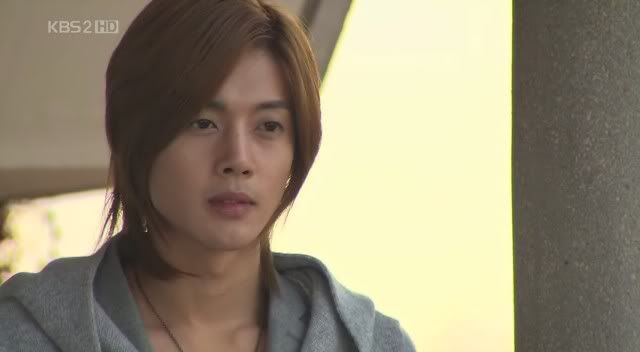
Finding out how privileged F4 is sends Jan-di into a rage — life’s too unfair. She takes particular umbrage at Jun-pyo for being such an asshole, because if he was born so lucky, he should be thankful and act kindly to others.
Too late, Jan-di looks down the staircase and spots a set of legs — someone’s taking a nap on the landing below. It’s Ji-hoo, who saunters up to her, telling her in his soft-spoken way that she’s disrupted his sleep. He heard the whole tirade, such as her calling them flies, and tells her the guy’s name is Jun-pyo, not Jung-pyo — if she’s going to rail against him, she ought to at least get the name right.
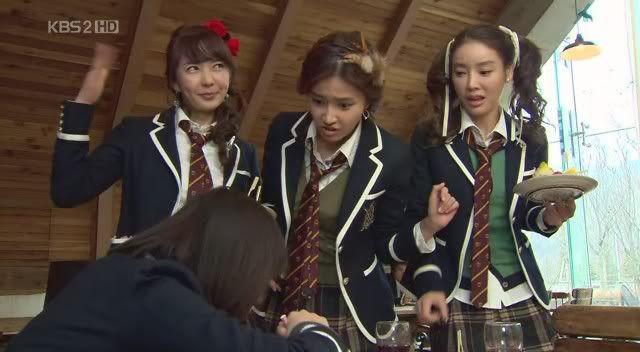
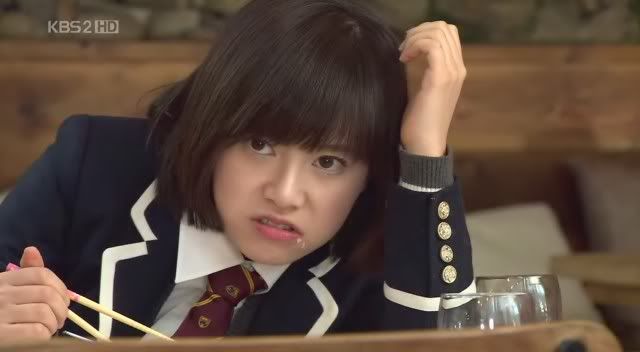
Lunchtime. The Bimbo Trio make it a point to hover and comment on Jan-di’s poor-person lunch. The cafeteria serves gourmet offerings, but Jan-di ignores them in favor of her plain lunchbox (rice, egg, Spam), which they now ridicule.
Unexpectedly, Jan-di receives a friendly overture from another new girl, Oh Min-ji, who is sweet, pretty, and recently transferred from Germany.

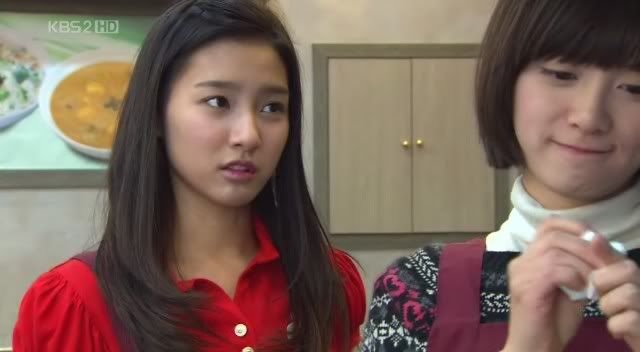
Ga-eul expresses relief that Jan-di made a friend; she was afraid she’d wind up an outsider. Jan-di replies glumly, “I am an outsider.” Still, she figures she can lie low until graduation, which prompts Ga-eul to ask what happened to the fearless protector who used to always stand up for her in elementary school.
But Jan-di figures she’ll have to stick it out. Her father’s absurdly proud of her fancy uniform (as a dry-cleaner, he can appreciate quality), while her mother pushes her to work on her looks so she can snag a rich boy. (Nobody ever said kdramas were feminist.)
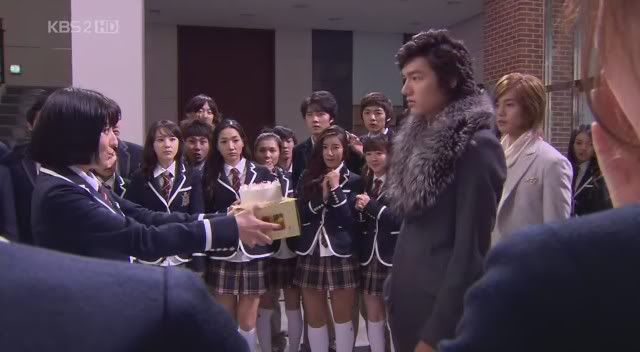
Jan-di’s patience is tried the next day, when F4 struts in looking cool, as usual, and a shy student presents Jun-pyo with a homemade cake and hopes that he’ll “accept her feelings.” Jun-pyo stares at her in his blank, haughty way, and takes the cake, as though accepting — to the girl’s excitement and the Bimbo Trio’s horror — until he then smashes the cake into her face.
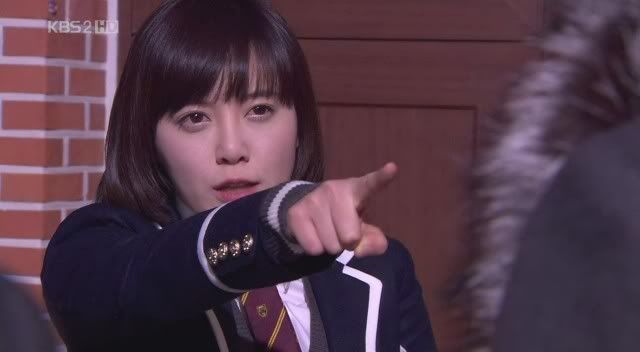
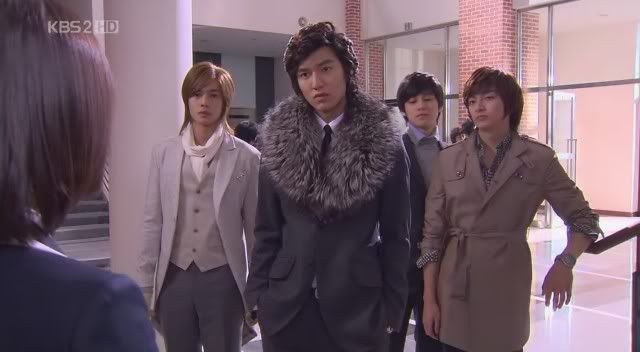
Jun-pyo walks off, only to find Jan-di in his path, trying to do her best to tamp down her fury. She unleashes a diatribe:
Jan-di: “You! Don’t you even have the barest human courtesy? I don’t bother hoping you’d have any humility for your riches. But if you didn’t want to eat it, you could have politely refused. Or, couldn’t you think of the feelings of the person who made the cake and accepted?”Unfortunately, Jan-di’s tirade is only in her head. When it comes time to say it, she backs down and mutters, “Never mind.” As Ji-hoo passes, though, he gives her a smile, as if knowing what’s running through her mind.
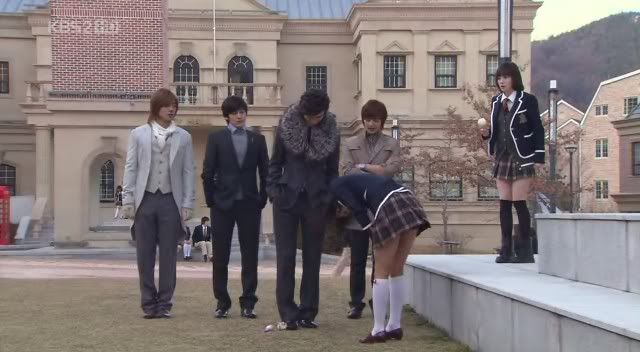
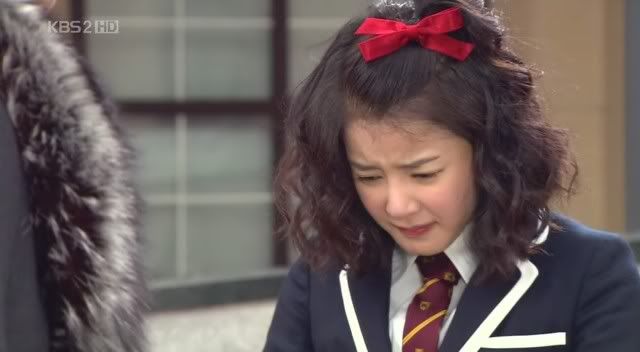
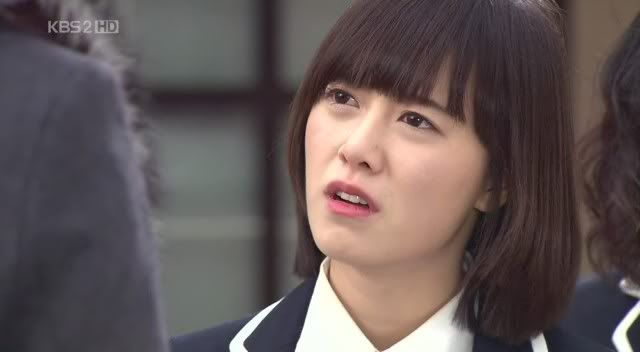
The next encounter isn’t so easily dismissed. Min-ji and Jan-di eat ice cream cones and chat cheerfully, when Min-ji slips and falls at Jun-pyo’s feet, getting ice cream all over his shoe. Immediately scared and apologetic, Min-ji tries to offer to pay for new shoes, then offers to do “whatever I can” to rectify the situation. When he tells her to lick the ice cream off his shoe, Jan-di steps in, saying he should accept the apology — it’s not like Min-ji fell on purpose. So Jun-pyo turns his derision onto Jan-di instead:
Jun-pyo: “Is it your thing to be obtuse and interfering? Why butt into someone else’s business?”Resignedly, Jan-di starts to bend over as Jun-pyo waits expectantly, but stops mid-bow. Instead, she shoves her ice cream cone in Jun-pyo’s face, causing him to fall over.
Jan-di: “She’s not just anyone, she’s a friend. But I guess they don’t include words like ‘friend’ or ‘friendship’ in rich people’s dictionaries.”
Jun-pyo: “Friend? Let’s see some of that great friendship in action. You lick it.”
Jan-di: “What?”
Jun-pyo: “If you do it for her, I’ll let this go.”
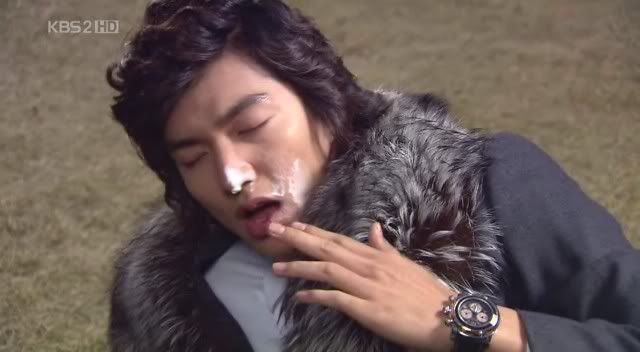
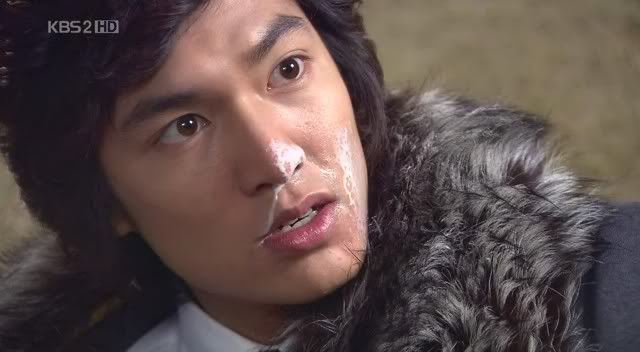
Jan-di scoffs, “So what, did you earn all that money yourself?” And no, her “thing” isn’t to interfere, it’s to stand up to the behavior of rich punks who rely on their rich parents.
Furthermore, she takes out a couple of bills (equivalent to a dollar) and throws three at him, referring to his stained clothing: “Our business charges 2,500 won, but I calculated using Kangnam [rich neighborhood] standards. If it still won’t clean, bring it by.”
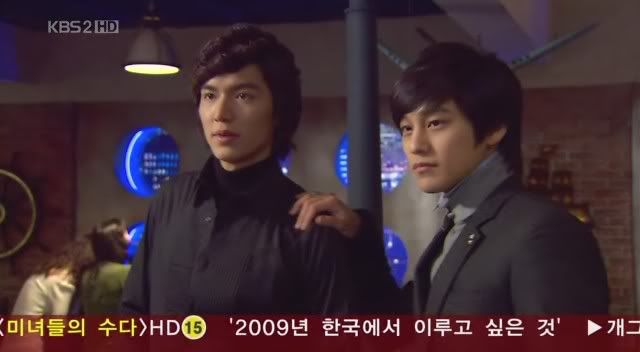
That night, Jun-pyo remains in a dark mood, trying to figure out how to get back at Jan-di. I’ll admit I burst out laughing when the song “Never Say Goodbye” came on, since it’s one of the main themes of PD Jeon’s previous series, My Girl, and he likes giving little nods to his previous works. [ Download ]
Audio clip: Adobe Flash Player (version 9 or above) is required to play this audio clip. Download the latest version here. You also need to have JavaScript enabled in your browser.
As the rest of the guys aren’t taking this seriously, they find Jun-pyo unusually fixated. Yi-jung suggests that Jun-pyo act in their “usual way,” and Jun-pyo’s gleeful reaction gives us our first glimpse of his, uh, not-quite-bright tendencies. 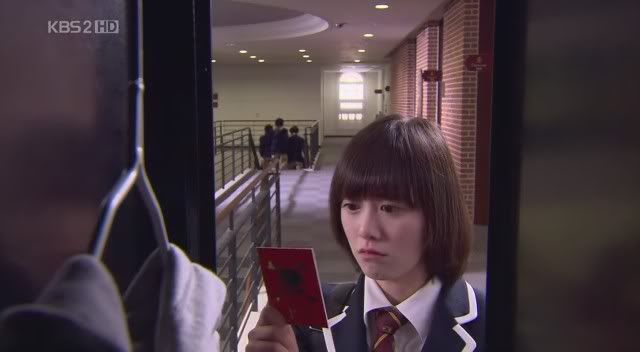
The next day, Jan-di gets the red card, but it doesn’t really mean much to her and she just tosses it away.
She finds out what the effects of red-carding are when she walks into class and her desk is gone. One of her notebooks is lying on the ground, graffiti’d with hate words, and when she bends down to pick it up, it jumps out of reach — someone’s tied a string to it.
Jan-di follows the leaping notebook out into the hallway, where her equally defaced desk is parked. Students start pelting her with eggs — and then a bucket of flour is dumped over her from above.
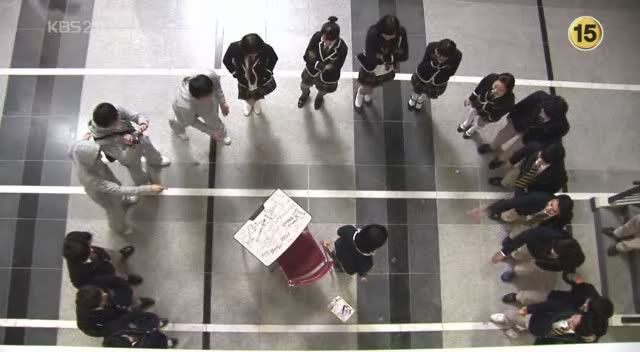

It’s the despoiling of her uniform that gets to her — she remembers how her father so proudly ironed it — and Jan-di shouts at them defiantly, “Go on! Keep going!”
When she looks to the crowd around her, Min-ji rushes off, too scared to show her support.
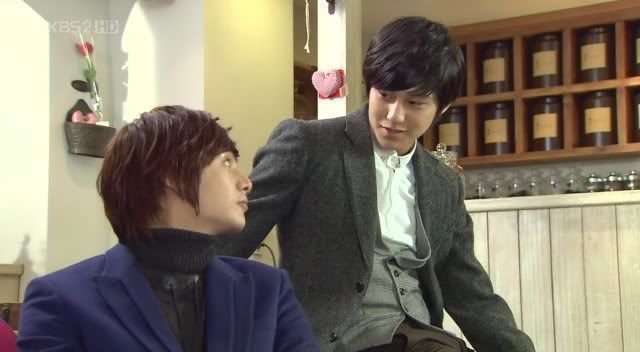
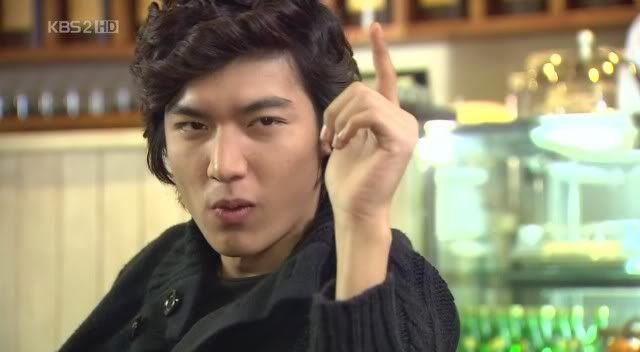
Meanwhile, F4 watches the proceedings on a television in their lounge. The other two (Yi-jung, Woo-bin) figure that’s the end of story, but Jun-pyo corrects them — it’s over when Jan-di comes begging on her knees.
I admit this is the scene when I totally fell for Lee Min-ho’s dunderheaded charms, because he’s absolutely convinced Jan-di will come through the door any minute now. He counts down, and his consternation when she doesn’t is hilarious.
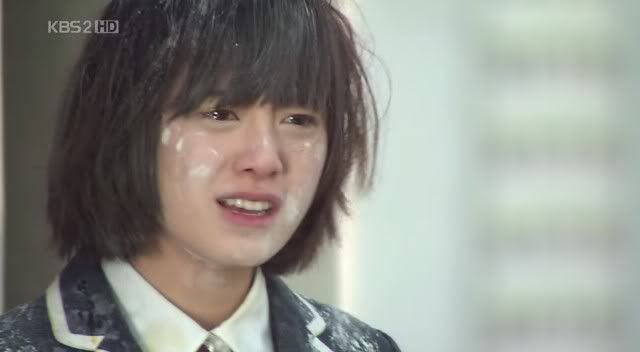
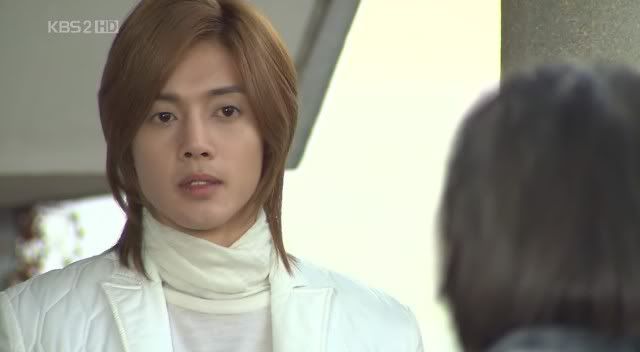
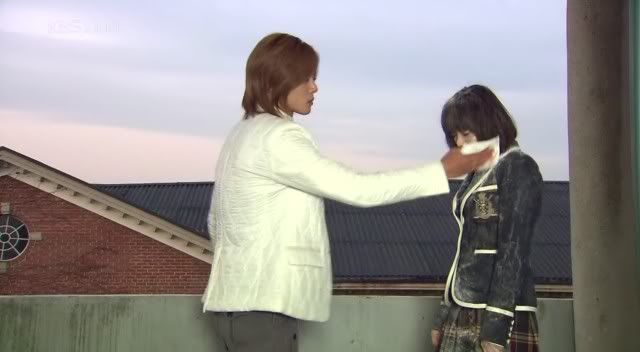
Jan-di retreats to her shouty stairwell (“Do you think because my name is Jan-di [grass], you can trample all over me?!”). Again, she’s interrupted by Ji-hoo, who’s relaxing on the landing below.
Oddly, he asks, “Do you know how to make pancakes?” Confused, Jan-di lists the ingredients. Taking in her appearance, Ji-hoo peers at her closely, then wipes the flour from her face and uniform with a handkerchief. Surprised and touched, she promises to return it later; he answers that he won’t be coming back, since the stairwell’s gotten a lot noisier recently.
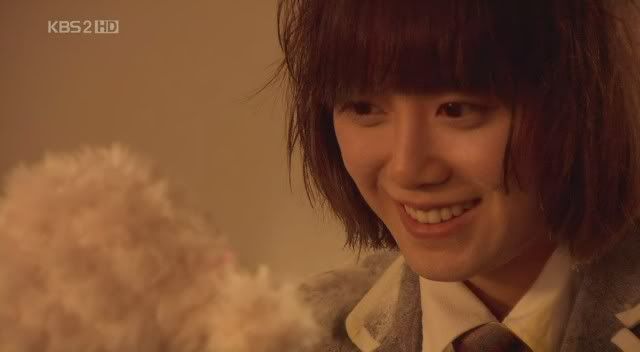
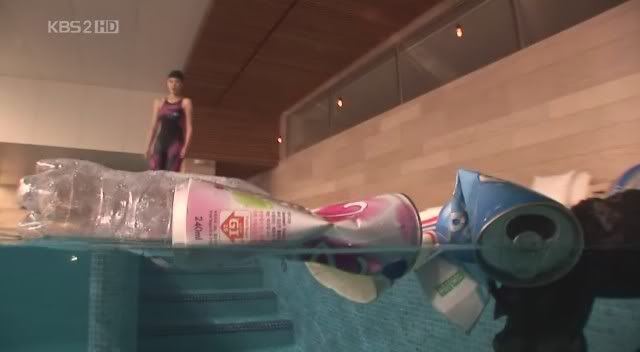
Jan-di’s mood lifts when she goes back to the now-empty classroom and finds a set of gym clothing and a stuffed animal on her desk. The toy has a voice-recorded message from Min-ji, which tells her, “I’m sorry. Forgive me for being a coward.”
When she goes for a swim, Jan-di finds the pool littered with trash — it’s Jun-pyo’s next phase in the Jan-di Tormenting Regimen.
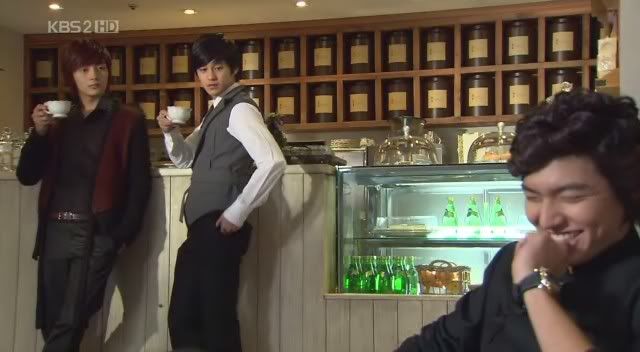
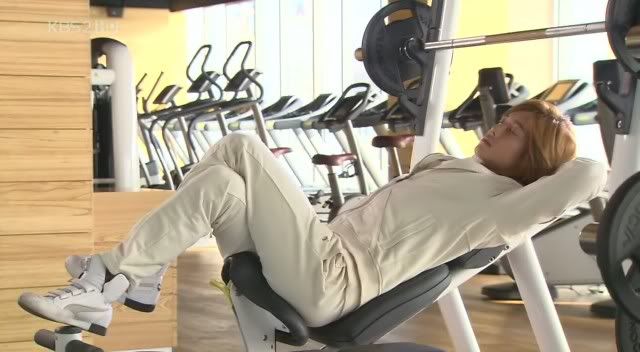
In fact, Jun-pyo’s so into his plans to ruin Jan-di’s life that even his friends are surprised he’s still so fixated on them, a week later. Yi-jung muses, “Isn’t she the first to really stand up to F4?”
(Ji-hoo isn’t with them because he’s off sleeping in a new location, although how anyone can sleep with legs crossed like that is a wonder. Way to flaunt that masculinity, Ji-hoo.)
All the while, Jan-di cleans out the pool, picking out all the empty bottles and soda cans. By the time she’s dressed in the locker room, she’s visited by more of Jun-pyo’s minions, who grab her, ignoring her screams, and start to carry her off.
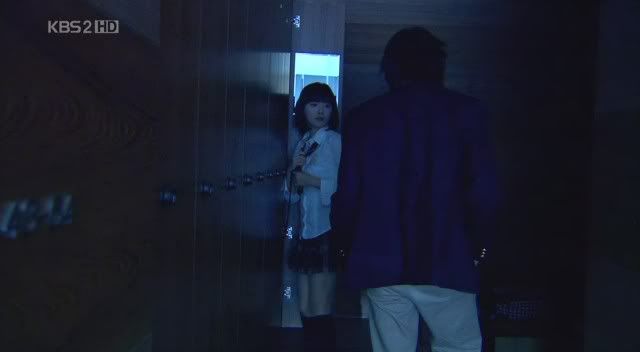

THE BAD
(1) Why hello there, familiarity. Waaaaay too much direct cribbing from the Japanese Hanadan. I was hoping they wouldn’t, and unfortunately, there were enough similarities that none of the plot points packed any punch. I suspect the drama will take off once it sheds the similarities, or so goes the hope.
(2) Character mimicry. As with the point above, it seems like a few characters have been lifted directly from the Japanese drama. Kim Hyun-joong playing Ji-hoo is fantastically cast — he looks and sounds the part completely. Only, it’s kind of like him acting as Oguri Shun, more than him acting as Rui. He’s pretty good, but I wish he’d do something to distinguish himself — add a little character tic, a variation or nuance — so that he isn’t just going to be labeled Shun #2.
(3) The overacting. There’s a lot of it. Jan-di, Jan-di’s family, the Tarty Trio — everyone’s laying it on rather thick. Gu Hye-sun actually looks fine as a 2nd-year high school student — but it’s her acting that’s the problem, because it’s like she’s acting 12 to overcompensate for being 25. If she just pulls back, she ought to be fine.
If you base the story in real emotions, you can carry the audience through some extreme plot turns, but if you never ground those emotions (and keep exaggerating everything), it’s a lot harder for us to get invested. There were some moments that broke through that cartoonishness (Jan-di’s reaction to being egged, for one), so let’s hope they go in that direction.
(4) The English. Oh my God, the English. There’s a scene where Yi-jung, ever the player, makes a move on an older woman in a store as she shops for china plates. He, the ceramics expert, suggests a better selection, and combined with Kim Bum’s questionable English and the white lady’s questionable acting, the scene was unwatchable. (The mute button and embarrassed laughter came into play.) Ginger the English-spouting Mean Girl gets a little embarrassing as well, although I suppose it’s her character to be absurd.
(5) Kim Joon, wassup man, that’s da bomb, yo yo yo! Let me reiterate: Oh my God, the English. I wonder if they’re, um, incorporating Kim Joon’s pop-singing background into his character. And don’t get me wrong, I am ALL in favor of giving F4 some added flair — letting these actors make the characters their own, and whatnot. I am NOT, however, in favor of bastardized gangsta-rap-inflected Engrish. Please. Stop.
The apologist version: If one were to make a defense against those complaints, I suppose one could argue that some scenes are just so iconic that even if it’s a repetition, it’s so much a part of the story that one shouldn’t just ignore it. For instance, the red cards in the lockers. Also, I think that Episode 1 requires a lot of setting up, which necessitates repeating many elements that are familiar to those who know Hanadan. When Boys Before Flowers did diverge from the familiar moments, it did much better. Hopefully things will improve once the series really gets going.
THE GOOD
The casting, hands down.
Surprisingly, the best part of Boys Before Flowers (for me) was Lee Min-ho. I was worried about him the most, but ended up totally relieved. He — unlike Gu Hye-sun, the Tarty Trio, Jan-di’s parents — did not overact. Also, he — unlike Kim Hyun-joong — seems to embody his character more than as a mere imitation of the Japanese Hanadan. He’s great playing the snide, arrogant leader of F4, but he’s also showing real promise at the character’s thick-headed, slightly ignorant side — he doesn’t play the character’s dumbness as overtly as Matsumoto Jun did, but it’s enough to be pretty funny. He totally looks the part, and acts the part, but so far isn’t just copying Matsumoto’s interpretation.
Despite my comments in the “Bad” section above, I’m actually pretty pleased with the overall acting. There don’t appear to be any glaring, unfixable deficiencies — I think flaws can be adjusted with some toning down and fine-tuning. Kdramas have typically done better (in my opinion) when they focus on the down-to-earth aspects of stories rather than the outlandish — Goong was better when it was about the troubled teenage marriage than when it was about monarchial conspiracies — so once the story gets going in earnest, I hope the drama finds its feet.

No comments:
Post a Comment